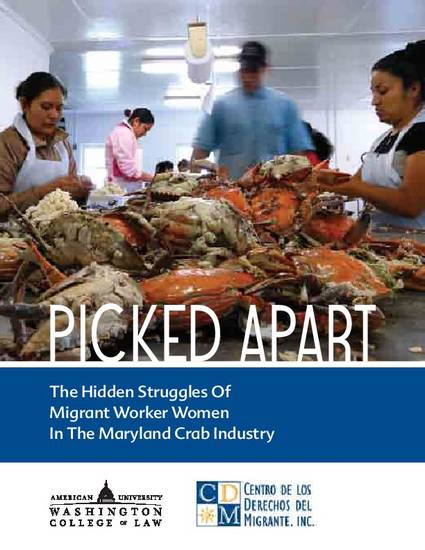
Every year, hundreds of Mexican women travel thousands of miles from their impoverished, rural home communities to work on the Eastern Shore of Maryland in the state’s historic crab industry. Maryland crab companies have increasingly come to rely on these women, who enter the U.S. on temporary guestworker visas known as H-2B visas. This report describes these women’s experiences as H-2B migrant workers, and is the result of over 40 formal interviews conducted in both the U.S. and Mexico since 2008. By obtaining first-hand accounts from the workers, the report documents the forces and conditions that give rise to this specific population’s decision to migrate; the processes and challenges involved in the recruitment process, and in obtaining documentation to travel to the U.S.; and the experience of living in Maryland and working in the crab industry. The research underlying this report reveals numerous challenges that migrant worker women face throughout the migration experience. Many of these challenges are linked to fundamental flaws with the H-2B program.
These systemic flaws implicate local, national, and transnational conditions. To that end, the authors have made recommendations, which can begin to remedy the workplace struggles the women currently face, in addition to brining the H-2B program into compliance with international norms. Some of the recommendations include the following: extending Maryland minimum wage and overtime protections to crab pickers and other seafood workers; implementing comprehensive, bilingual occupational health and safety trainings for new and returning H-2B crab workers; deploying bilingual health care outreach workers to the Eastern Shore to assess, on a periodic basis, work-related injuries or other health concerns of the H-2B migrant workers; educating H-2B crab workers at the beginning of each season about their basic rights as tenants in the State of Maryland; regulating recruitment practices, and sanctioning employers who utilize recruiters that charge excessive or improper fees to workers; reforming guestworker visas so that workers are not tied to one employer, which will allow workers to leave abusive working conditions and still benefit from employment in the United States; and urging the U.S. government to ratify the International Convention on the Protection of the Rights of All Migrant Workers and Members of their Families.
